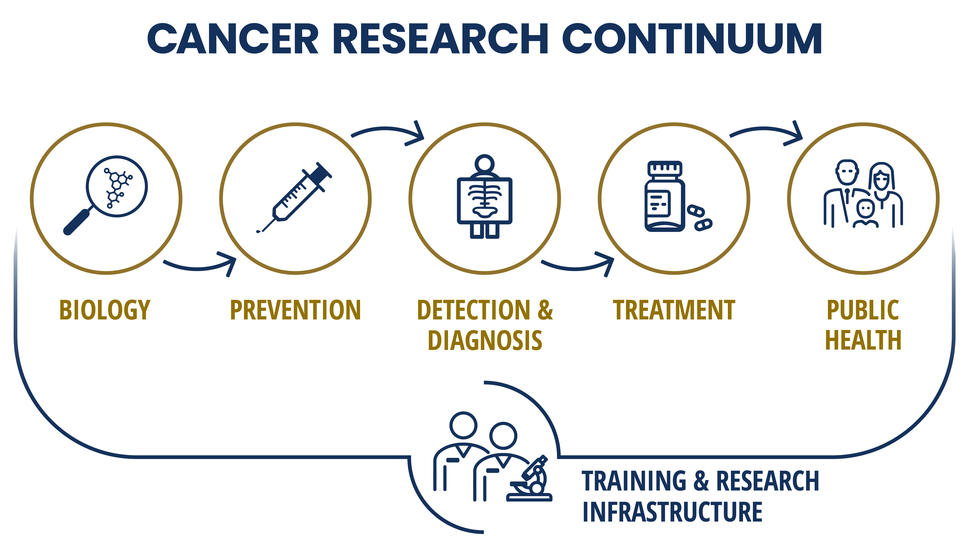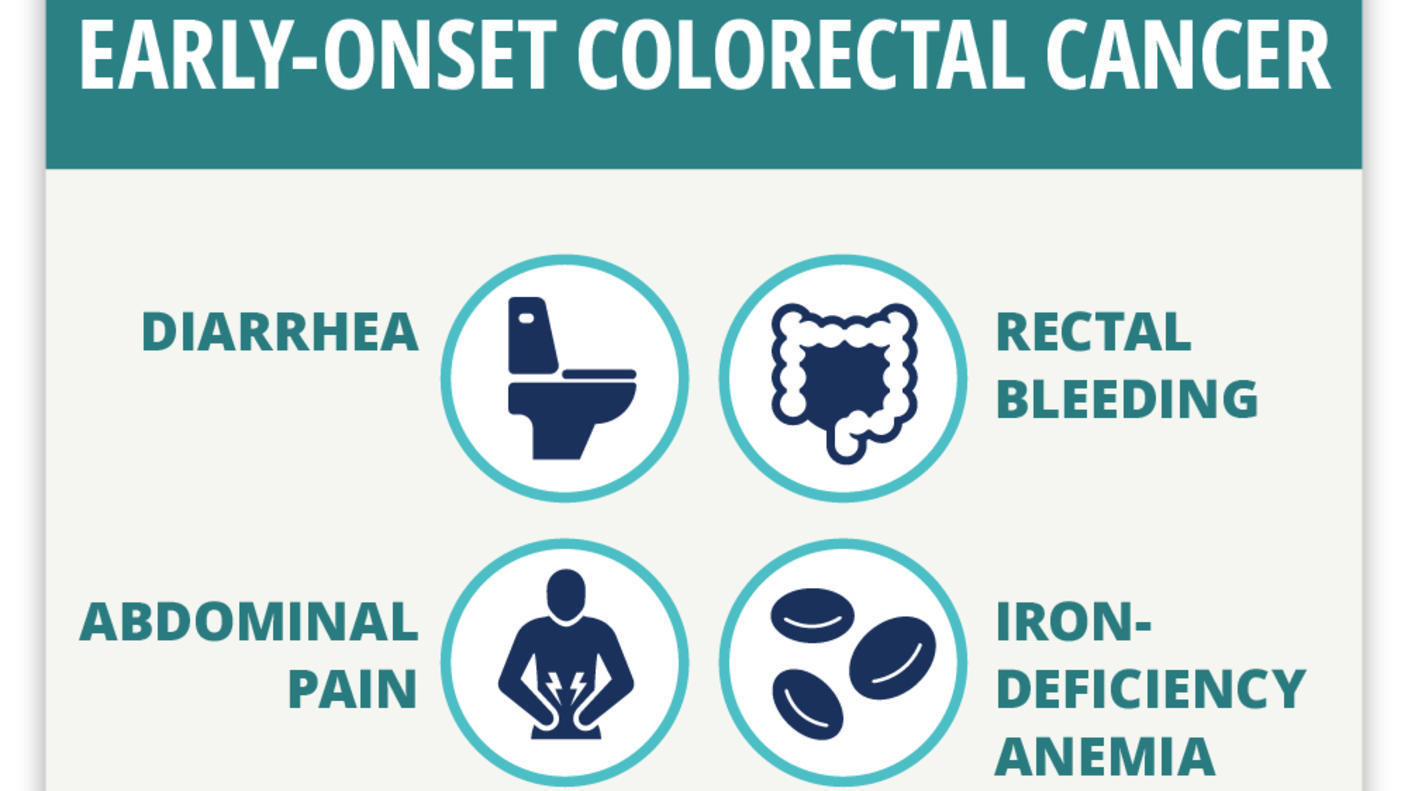NCI enables advances against cancer by investing in a broad portfolio of research, supporting the cancer research workforce, and sustaining the infrastructure that enables cutting-edge research to succeed. All these components are essential to lead progress against cancer and accomplish the goals of the National Cancer Plan.
NCI’s support of basic, translational, and clinical research is helping to reduce the burden of cancer by driving discovery to improve cancer risk assessment, prevention, detection, diagnosis, treatment, and survivorship. Sustained and robust support for NCI’s work is needed to realize the long-term vision of ending cancer as we know it for all populations.
Providing hope: The power of cancer biology research
Virtually every new cancer diagnostic, therapeutic, or preventive measure begins with addressing a basic science research question. Through decades of carefully planned experiments in laboratories across the country, researchers generate fundamental knowledge that often cuts across multiple types of cancer. It’s these investments in cancer biology research that support the groundwork needed to discover and advance lifesaving cancer interventions. Continued support is then required to build on these findings.
NCI is the largest funder of the basic research that is critical for making sustained progress against cancer. Cancer survivors and those at risk of developing the disease rely on the innovative approaches that cancer biology research delivers.
For example, through cancer biology research, NCI-supported researchers have:
- pinpointed a specific type of bacteria linked with colorectal cancer, which could inform new strategies for cancer screening and treatment
- mapped interactions between tumor cells and their environment in stomach cancer to improve our understanding of how the disease advances
- updated long-held beliefs about cell division that could change the way we treat some fast-growing tumors
- identified an unexpected way tumor cells hide from the immune system, revealing a new target to help expose the cancer to immune cells
Discoveries like these, and many others, open the door to new cancer prevention, interception, and treatment options where few or none currently exist and provide hope that one day all cancers will be treatable.
Read more about NCI’s related research areas, including cancer biology research, cancer genomics research, and research on causes of cancer.
Reducing the burden: The potential of cancer prevention
While overall cancer mortality continues to decrease, researchers estimate that more than half of cancer deaths are preventable. More research investments are needed to learn how to implement, improve, and build on current prevention strategies and intercept cancer more effectively by improving treatment of precancerous lesions.
Researchers have identified several preventable factors in cancer development, such as health behaviors, exposure to cancer-causing agents, and social determinants of health. However, there is still much more to learn about how changes in these risk factors influence cancer risk. The knowledge gained from cancer prevention research can be used to refine guidelines and implement targeted measures to reduce the incidence of cancer.
For example, NCI-funded researchers are investigating new ways to prevent precancerous conditions from progressing to cancer and new ways to improve cancer screening in underserved areas. This research has enabled progress in several areas. NCI-supported groups have:
- shown that treating a precancerous anal condition in people with HIV reduces their risk of anal cancer by more than half
- launched the SHIP Trial Network to evaluate a self-collection method for human papillomavirus (HPV) testing as a way to screen for cervical cancer, especially among underserved and under-screened people
- found that simple reminders can increase the number of patients who complete follow-up testing after an abnormal cancer screening result, which aids in cancer prevention and early intervention
- improved breast cancer risk prediction tools for Black women, who have a 40% higher rate of breast cancer death than White women, by adding genetic information to the traditional questionnaire-based factors that can inform screening decisions
Through rigorous scientific studies, researchers can assess the impact of cancer prevention strategies, identify areas for improvement, and develop more efficient and accessible intervention approaches to reduce the burden of cancer.
Read more about NCI’s related research areas, including cancer prevention research.
Intervening early: The urgency of cancer detection and diagnosis research
Imagine if fewer people suffered and died from cancer because we detected and diagnosed the disease or its precursors at the earliest possible stage.
Accurately identifying cancer—and precancerous lesions—and assessing its severity is the primary goal of cancer detection and diagnosis research. Early detection can save lives. An imprecise approach, however, can lead to overdiagnosis, overtreatment, and unnecessary physical, psychological, and financial harm.
Investing in cancer detection and diagnosis research can help develop more sensitive, accurate, and cost-effective methods that provide information about not only the cancer type but also detailed genetic information to support targeted cancer therapies and precision medicine. This research can also establish the impact that screening could have on survival rates for selected cancer types. With the rise of multi-cancer detection tests, NCI launched the Cancer Screening Research Network to evaluate potential survival benefits, or other outcomes, from this new type of tool.
With recent advances in NCI-funded detection and diagnosis technology, scientists have capitalized on novel opportunities. For example, NCI-supported researchers have:
- developed a noninvasive method of detecting colorectal cancer using engineered bacteria that can sense DNA shed by tumors into the gut
- identified four key warning signs that could help health providers find colorectal cancer at an earlier and more treatable stage in younger adults, a population that has experienced rising rates of colorectal cancer over the last few decades
- overcome the challenge of assembling a large and diverse data set for a rare brain cancer called glioblastoma, enabling the creation of an AI model that can more accurately detect tumor boundaries prior to surgery
- developed a urine-based test that can distinguish between slow-growing prostate cancers that pose little risk and more aggressive cancers that need treatment, potentially helping some people avoid unnecessary procedures
Cancer detection and diagnosis research is primed with these emerging technologies. Carefully assessing their impact on cancer outcomes will limit risk and ensure benefit from these new screening and detection methods.
Read more about NCI’s related research areas, including cancer screening and early detection research and cancer diagnosis research.
Innovating treatment: The need for more effective and less toxic cancer therapies
For more than 50 years, NCI has played a vital role in the development of more effective and less toxic therapeutic options for patients with cancer. Despite the steady progress in improving treatments, some forms of cancer still lack effective therapies, many cancers eventually develop resistance to treatment, and not all people have equal access to cutting-edge treatments. Adding to the challenge, patients with cancer often experience severe side effects from the disease and its treatment, which for childhood cancer survivors can impact their quality of life for decades.
These challenges can be overcome. Investments in treatment research today will inspire and sustain the safe and effective cures of tomorrow. For example, NCI-supported researchers have:
- pioneered groundbreaking research using lymphocytes (a type of immune cell) from a person’s own tumor to treat their advanced melanoma, garnering FDA approval of a first-of-its-kind personalized treatment
- completed a clinical trial that led to the first FDA approval of an immunotherapy for advanced alveolar soft part sarcoma, a rare soft tissue cancer that requires frequent surgeries and affects mostly adolescents and young adults
- developed a targeted drug combination to treat patients with a rare type of brain tumor called a papillary craniopharyngioma, potentially eliminating the need for surgery or radiotherapy
- conducted the MIRASOL trial, which led to FDA approval of a novel therapy to improve overall survival in people with advanced ovarian cancer that had stopped responding to standard chemotherapy
More research is needed to ensure that all patients with cancer have safe and effective therapies and the highest possible quality of life.
Read more about NCI’s related research areas, including cancer treatment research and research on childhood cancers.
Improving public health: The role of cancer control and health care delivery research
Each year, cancer has a significant impact on public health, affecting the nation’s economy and the quality of life for millions of people in the United States. NCI invests in studies to identify population-wide trends in cancer and to improve the delivery of cancer interventions. NCI also supports research that enables people to live a healthy life after cancer.
More research is needed to design interventions that improve cancer prevention, screening, treatment, and survivorship outcomes and to address why certain racial, ethnic, and rural populations suffer disproportionately from some cancers. This research can inform policies that reduce cancer-causing exposures, ensure greater compliance with health recommendations, minimize misinformation, and address gaps in the health care system when cancer survivors transition from oncology care to primary care.
Additional investments in cancer control and implementation research will improve the lives of cancer survivors and the general population, while ensuring that all population groups benefit from advances in cancer research. For example, NCI-supported groups have:
- estimated that more than 15,000 deaths could be prevented if 10% more of the eligible U.S. population used lung, colorectal, breast, and cervical cancer screening tests
- revealed gaps in public awareness that drinking alcohol of any type raises the risk of cancer, a finding that can support efforts to reduce the health impact of alcohol
- launched the Persistent Poverty Initiative to help alleviate the cumulative effects of persistent poverty on cancer outcomes by building research capacity, fostering cancer prevention research, and promoting the implementation of community-based programs
- discovered that the right side of the colon ages significantly faster than the left side in African Americans, possibly explaining why these individuals are more likely to suffer from right-sided colon cancer, which doesn’t respond as well to conventional chemotherapies
Researchers are working hard to understand population-level impacts on cancer control and to design and test interventions along the cancer continuum that can address disparities and ensure good health for all people.
Read more about NCI’s related research areas, including public health research and cancer and cancer health disparities research.
Strengthening the research enterprise: The need for a robust cancer research workforce and infrastructure
An extensive research infrastructure and a stable workforce comprise the backbone of the entire cancer research enterprise, and NCI provides a level and scope of infrastructure and training that cannot be matched by other organizations. Investing in these critical needs is of the greatest importance in leading progress against cancer.
All cancer research requires a robust workforce and infrastructure. This includes cancer centers where clinical trials can test new approaches to prevent and treat cancer, facilities that develop and manufacture novel technologies and medicines, electronic databases to support large amounts of biomedical data, and programs and initiatives to train a workforce that drives cancer research forward.
These elements need continued investments to remain strong and capitalize on new opportunities. With continued investments, NCI has:
- launched the new Virtual Clinical Trials Office, an effort to accelerate nationwide participation in cancer clinical trials with remote clinical research support staff who assist teams in community-based and remote settings
- supported the next generation of cancer researchers through the K99/R00 Pathway to Independence Program, which helped 95% of surveyed award recipients transition from postdoctoral research to research independence
- engaged more than 500 middle-school, high-school, and undergraduate students and their teachers through a Youth Enjoy Science (YES) Research Education Program at the University of Nebraska Medical Center, increasing representation of Native Americans in pursuit of cancer careers
- released a comprehensive data set that combines molecular and clinical data from individual studies of more than 1,000 tumors across 10 cancer types, which is publicly available through NCI’s cloud-based Cancer Research Data Commons
Investing in the NCI-supported cancer research workforce and infrastructure ensures that all research areas supported by the NCI budget produce the highest quality research in the most effective way possible.
Read more about NCI’s cancer research infrastructure and the Center for Cancer Training.






